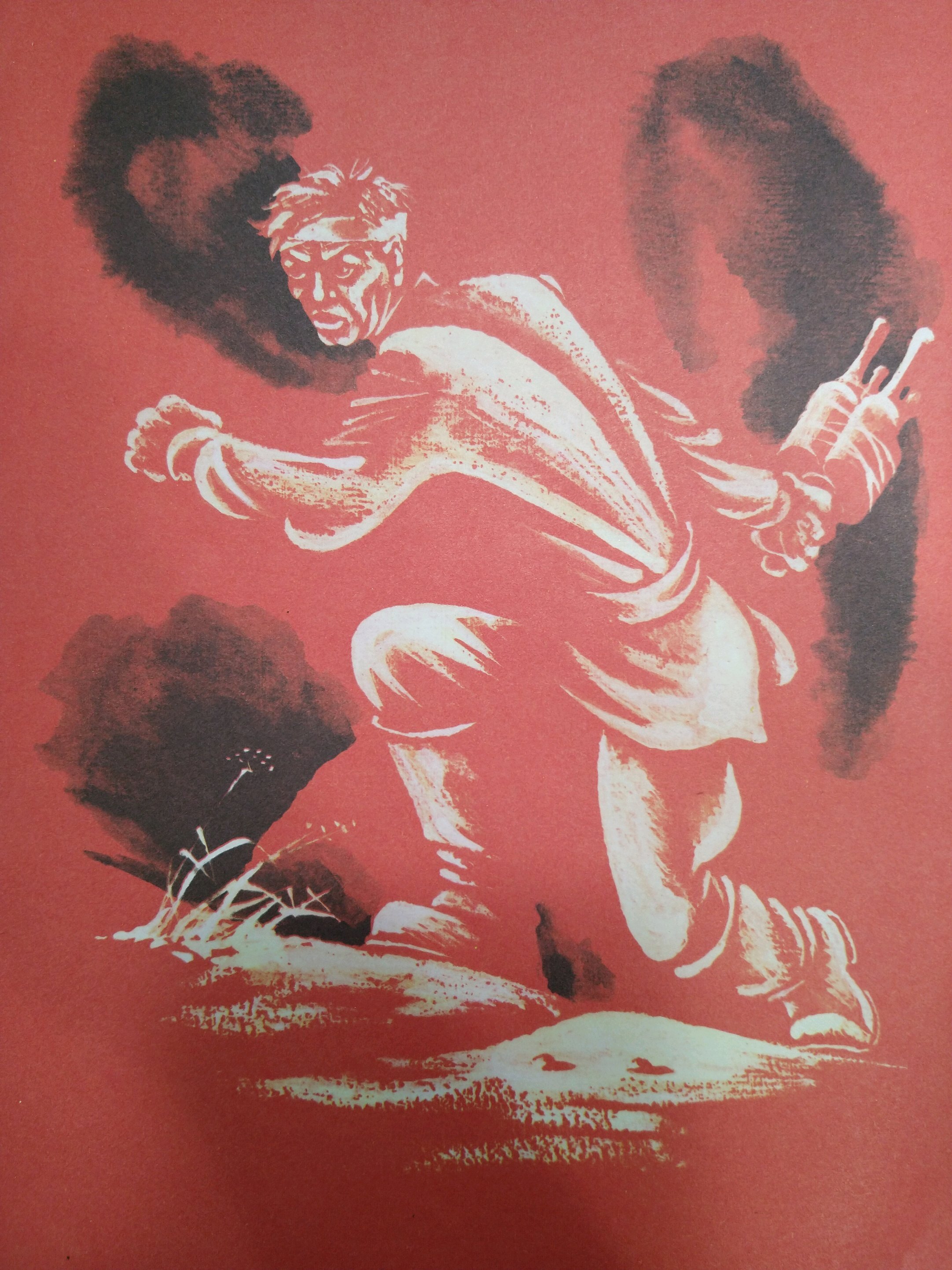The Eternal Flame (Timofey Belozerov)
Timofey Belozerov was a well-known Soviet children’s poet and author. Although heavily published in the USSR, Belozerov seems to be mostly forgotten today.
Belozerov’s poem The Eternal Flame was published in 1985, when the Soviet government held elaborate celebrations for the fortieth anniversary of victory in World War 2. In Belozerov’s work, the narrator tells a brief story of a visit to an eternal flame—presumably the one in Moscow—and, somewhat scoldingly, explains the debt today’s children owe to those martyred in the war. Combined with the rather graphic and dark illustrations, this is quite a shocking piece compared to representations of war shown to western children.
The Eternal Flame
I walk in the memorial park,
Where the stones
are smooth as glass.
The melancholy sound of music
Weighs sad, bright on my heart.
The iron banners mute,
Marble and granite shine,
The still nighttime dew,
Remains too on the lawn.
That’s not a firebird flapping
Its pensive, fiery wing—
But a flame in bronze chalice
Where memory lives long.
Under shaded trees in the garden,
It burns like sun in grey skies,
Two pioneers stand guarding,
Holding firm a pair of rifles.
The remains of a general
And a private are buried here.
In the quiet, both painful memory
And iron tanks rumble near.
My young impatient friend,
Reader of these lines!
You’re free, your joy has no end.
You’re living in carefree times.
Everything is easy for you:
You have space and light too,
You’re fed and clothed by your parents.
But it could’ve been
quite different…
Back on one chilly morn,
When first the flowers bloom,
Airborne armadas swarmed,
Their fascist crosses loomed.
Buckled helmets swayed,
With mess tins loudly jangling,
Gleaming guns sprayed
Bullets at women and children.
Tank tracks noisily thundered,
Villages, fields were plundered.
And your life was like a spark,
A little star, quiet in the dark.
Sometimes it hardly shone,
And sometimes was so pale,
That it was very nearly gone;
you could have
ended up a slave.
A slave with no name or kin,
No right to think or dream,
No right to cry out, proud within,
“Country, Freedom, Russia!”
…to such slavery we would not yield!
A foreign flag in the breeze,
Foreign birds in the field,
Foreign berries on our trees.
Don’t dare learn or utter
A single Russian word or letter.
Learn to mend and iron hems,
For those fattened pigs,
And don’t dare challenge them.
Learn to scrape and bow and dip,
But don’t you dare hide from the whip.
Don’t you dare
Don’t you dare
Don’t you dare
Don’t you dare!
Those who hid from all that strife,
Weren’t those who saved your life.
They burned up hot in our planes,
And froze in trenches snowy,
They drowned in the seas and the rains,
Facing death to kill the enemy.
Our soldier is bandaged, bloody.
His gun on the earth laid,
He wields a heavy bundle,
Of anti-tank grenades.
In the grey German landscape,
Driven by rage and fury,
He confronts the tigers and panthers.
He leaves behind death
And welcomes immortality
With a cry of “No step back!”
His every step fatal,
Until over the Reichstag
He spies flying our
Soviet
Flag!
…the starlings
hurry o’er the park,
Flying to the fields, away from the dark.
An old lady with a bouquet,
Approaches the Eternal Flame.
From her shoulders, thin and old,
Slips
a mourning
shawl,
In her eyes, tired and cold,
Are hope, pride, sadness—all.
She visits the grave her son lies in,
In hand a
single flower…
He fell at the walls of Berlin,
With bloodied, beaten brow,
With paid-out telephone spool,
With brickdust on his shoulders,
With sweaty cap tied to tunic,
With a single word—“Mama”—
He was laid to rest…
Today is splendid and gracious,
Clouds float higher, more and more,
And out, up, from the chalice,
Rises the flame, to burn forevermore.









